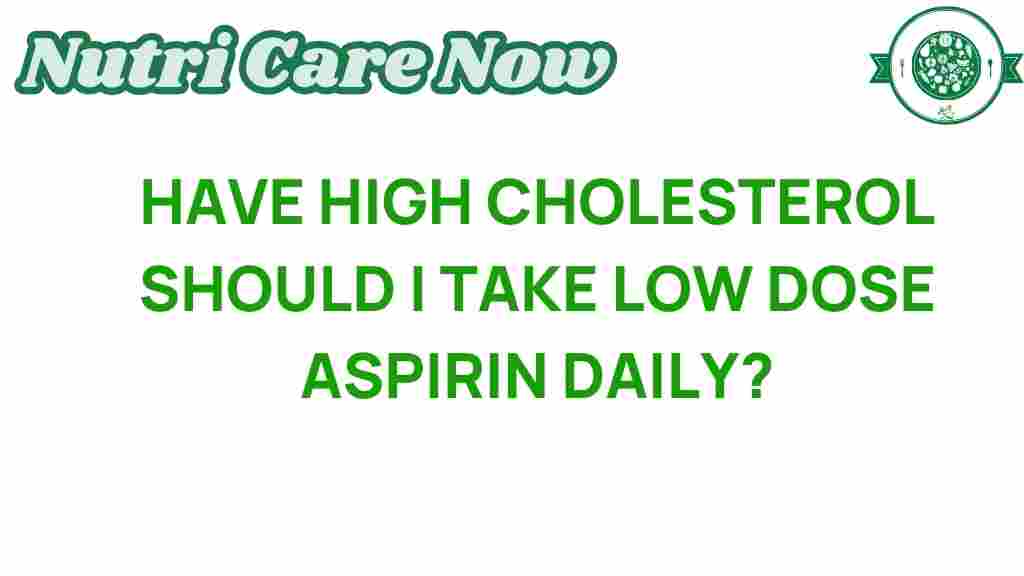Should You Consider Daily Low-Dose Aspirin for High Cholesterol?
When it comes to managing high cholesterol and promoting heart health, many individuals seek various methods to improve their cardiovascular condition. One such method that has gained attention is the use of low-dose aspirin. This article explores the potential benefits, risks, and considerations of incorporating daily low-dose aspirin into your routine for high cholesterol management.
Understanding High Cholesterol
High cholesterol is a common condition characterized by elevated levels of lipids in the blood, particularly low-density lipoprotein (LDL), which is often referred to as “bad cholesterol.” When LDL levels are high, the risk of developing heart disease and other cardiovascular problems increases significantly.
How Does Low-Dose Aspirin Work?
Low-dose aspirin works as an antiplatelet medication, which means it inhibits the formation of blood clots. This can help prevent heart attacks and strokes, conditions that are often linked to high cholesterol levels. The mechanism behind this is that aspirin reduces the ability of platelets in the blood to clump together, thus reducing the risk of blockages in the arteries.
The Benefits of Low-Dose Aspirin for Heart Health
Here are some potential benefits of taking low-dose aspirin for heart health, particularly for those with high cholesterol:
- Reduction of Cardiovascular Events: Studies have shown that low-dose aspirin can significantly lower the risk of heart attacks and strokes among individuals at risk.
- Cost-Effective: Aspirin is widely available, inexpensive, and does not require a prescription.
- Easy to Integrate: Incorporating daily low-dose aspirin into your routine is straightforward and requires minimal lifestyle changes.
Who Should Consider Taking Low-Dose Aspirin?
Daily low-dose aspirin may be recommended for certain groups of individuals, especially if they have:
- Existing cardiovascular disease
- High cholesterol levels
- Diabetes
- A family history of heart disease
- High blood pressure
However, it is crucial to consult with a healthcare provider before starting any medication, including low-dose aspirin, to determine if it is appropriate for your specific health conditions.
Daily Dosage of Low-Dose Aspirin
The typical daily dosage of low-dose aspirin is between 75 mg to 100 mg. It is essential to follow your doctor’s recommendations regarding the dosage, as individual needs may vary based on health status and risk factors.
Potential Risks and Side Effects
While low-dose aspirin can provide benefits for heart health, it is not without risks. Some potential side effects include:
- Gastrointestinal Issues: Aspirin can cause stomach irritation, ulcers, or bleeding in some individuals.
- Allergic Reactions: Some people may experience allergic reactions, including rash or difficulty breathing.
- Increased Bleeding Risk: Aspirin can increase the risk of bleeding, particularly in those with certain medical conditions or those taking other medications that affect blood clotting.
It’s critical to discuss these risks with your healthcare provider to ensure that the benefits of taking low-dose aspirin outweigh the potential side effects for your situation.
Alternatives to Low-Dose Aspirin
If low-dose aspirin is not suitable for you, there are alternative medications and lifestyle changes that can also help manage high cholesterol and improve heart health:
- Statins: Medications that help lower cholesterol levels.
- Fibrates: Another class of medications that can help reduce triglycerides and improve cholesterol levels.
- Healthy Lifestyle: Eating a balanced diet, exercising regularly, avoiding smoking, and maintaining a healthy weight can significantly improve cholesterol levels and overall heart health.
Step-by-Step Process to Incorporate Low-Dose Aspirin
Here’s a step-by-step guide for those considering adding low-dose aspirin to their health regimen:
- Consult Your Doctor: Schedule an appointment with your healthcare provider to discuss your cholesterol levels and heart health. Determine if low-dose aspirin is appropriate for you.
- Discuss Dosage: If approved, talk about the right dosage and whether to take it in the morning or evening.
- Monitor Your Health: Keep track of any side effects or changes in your health. Regular follow-ups with your doctor are essential.
- Combine with Lifestyle Changes: Implement dietary changes, increased physical activity, and other heart-healthy habits alongside taking low-dose aspirin.
Troubleshooting Tips
If you experience any side effects or have concerns while taking low-dose aspirin, consider these troubleshooting tips:
- Report Side Effects: Contact your doctor immediately if you experience severe gastrointestinal discomfort or signs of an allergic reaction.
- Adjust Timing: If you notice stomach issues, you may want to try taking aspirin with food to minimize irritation.
- Regular Check-Ups: Schedule routine blood tests as advised to monitor cholesterol levels and overall health.
Conclusion
In conclusion, low-dose aspirin can be a valuable tool for some individuals with high cholesterol in their quest for improved heart health. However, it is essential to weigh the risks and potential side effects before starting this medication. Always consult your healthcare provider for personalized advice and consider integrating lifestyle changes that can also significantly impact your cardiovascular health.
For more information on managing high cholesterol and cardiovascular health, check out this resource on heart disease prevention. Additionally, learn more about aspirin use in various medical conditions.
This article is in the category Health and created by NutriCareNow Team
